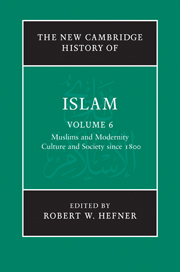Book contents
- Frontmatter
- 1 Introduction: Muslims and modernity: culture and society in an age of contest and plurality
- PART I SOCIAL TRANSFORMATIONS
- PART II RELIGION AND LAW
- 11 Contemporary trends in Muslim legal thought and ideology
- 12 A case comparison: Islamic law and the Saudi and Iranian legal systems
- 13 Beyond dhimmihood: citizenship and human rights
- 14 The ʿulamāʾ: scholarly tradition and new public commentary
- 15 Sufism and neo-Sufism
- PART III POLITICAL AND ECONOMIC THOUGHT
- PART IV CULTURES, ARTS AND LEARNING
- Glossary
- Bibliography
- Index
- References
15 - Sufism and neo-Sufism
from PART II - RELIGION AND LAW
Published online by Cambridge University Press: 28 March 2011
- Frontmatter
- 1 Introduction: Muslims and modernity: culture and society in an age of contest and plurality
- PART I SOCIAL TRANSFORMATIONS
- PART II RELIGION AND LAW
- 11 Contemporary trends in Muslim legal thought and ideology
- 12 A case comparison: Islamic law and the Saudi and Iranian legal systems
- 13 Beyond dhimmihood: citizenship and human rights
- 14 The ʿulamāʾ: scholarly tradition and new public commentary
- 15 Sufism and neo-Sufism
- PART III POLITICAL AND ECONOMIC THOUGHT
- PART IV CULTURES, ARTS AND LEARNING
- Glossary
- Bibliography
- Index
- References
Summary
Overview on Wahhābism, colonialism and Sufi networks
Institutional Sufism from the nineteenth century to today can be assessed under three discrete but related rubrics: Sufi Africa, Sufi Asia (including the Middle East) and Sufi America. If this accent is locative, it is also temporal, marking the nineteenth–twentieth and now twenty-first centuries by Sufi developments in particular parts of the globe. Overarching and connecting these subsets is a common theme: Sufism/neo-Sufism intensifies Islamic loyalty, while also distinguishing Sufi from non-Sufi Muslims, by underscoring the unique status of the Prophet Muḥammad.
A single question demarcates Sufi from non-Sufi Muslims: is the Prophet Muḥammad alive or dead? For non-Sufi Muslims, the question is itself a mark of heretical intent. Of course, the Prophet is dead, and with his death in seventh-century Arabia there ceased to be any human mediator between the living and the dead. What the Prophet bequeathed to his followers was the Qurʾān and Ḥadīth, sayings that later became codified as Sunna, his own model of exemplary conduct. Sunna complemented, even as it amplified, the Qurʾān. Together the Qurʾān and the Sunna have been interpreted by the ʿulamāʾ. There is no authority in Islam apart from the books and the learned custodians of the books. To the extent that the Prophet lives, it is through his legacy in books, preserved and mediated by the ʿulamāʾ.
- Type
- Chapter
- Information
- The New Cambridge History of Islam , pp. 355 - 384Publisher: Cambridge University PressPrint publication year: 2010

